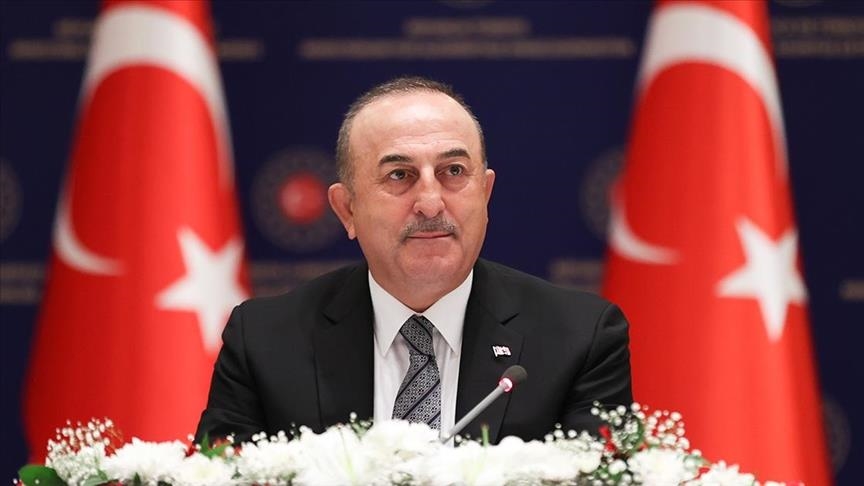
ANKARA
Türkiye on Thursday again drew a red line against any expansion of Greek territorial waters in the Aegean Sea.
"We will not allow the expansion of (Greek) territorial waters by even 1 mile in the Aegean, let alone 12," Foreign Minister Mevlut Cavusoglu told an end-of-year press briefing in the capital Ankara, responding to reports that Athens plans to extend territorial waters around the island of Crete to 12 nautical miles.
Citing a Turkish parliamentary 1995 decision on the matter, Cavusoglu said: "We are warning Greece once more. Don’t get into sham heroism by trusting those who might have your back. Don't seek adventurism. It won't end well for you!"
The 1995 declaration warns that if Greece increases its territorial waters in the Aegean beyond 6 miles, parliament will give "all powers,” including military powers, to the government to defend Türkiye's interests.
Cavusoglu said that declaration "remains in force today."
Pledging to continue protecting Türkiye's rights and interests in the Aegean and Eastern Mediterranean seas, Cavusoglu also reminded that Ankara tried to operate dialogue channels with Athens.
"However, we suspended the dialogue due to (Greek Premier Kyriakos) Mitsotakis' campaign against Türkiye, provocations in the Aegean, allegations of genocide, and pressure on Turks of Western Thrace," he added.
The Western Thrace region -- located near Greece's northeastern border with Türkiye -- is home to a substantial, long-established Muslim Turkish minority numbering around 150,000.
The rights of Turks of Western Thrace are guaranteed under the 1923 Treaty of Lausanne. But over the decades, the situation has seriously deteriorated, with Greece refusing to carry out rulings by the European Court of Human Rights.
Türkiye has long criticized Greece for depriving the Muslim Turkish minority of their basic rights and freedoms.
Emphasizing that Türkiye is a "key country" for Europe on "fundamental issues from energy to food, from security to migration, from production to supply chains," Cavusoglu said: "The strategic blindness of the EU prevents them from seeing the truth."
"The EU surrenders to the impertinence of the Greek-Greek Cypriot duo," he said, adding that such "blindness" of the EU could only be overcome by Türkiye's full membership to the bloc.
Türkiye continues its dialogue with the UN, US, Russia, Iraq as well as Syria's Bashar al-Assad regime, he said, also commenting on a tripartite meeting of the Turkish, Russian, and Syrian defense ministers and intelligence officials in Moscow on Wednesday.
"I will also be meeting with (Russian Foreign Minister Sergey) Lavrov," he added.
Some issues that have become "chronic" continued to take up Türkiye's diplomatic agenda, including "issues related to Africa, the Balkans, the Caucasus, Afghanistan, Libya, Syria, Yemen, Lebanon, and Palestine, as well as the climate change, global pandemic, irregular migration, terrorism, racism, and xenophobia," Cavusoglu said.
The global system is going through a "multiple-crisis period," the Turkish minister stressed, saying there is also a global transformation.
"With the US-China split and the Sino-Russian rapprochement against the West, there is the possibility of a 'loose bipolar system'," he said, noting that all of these are "the birth pangs of a new system."
Displaying figures about Türkiye's "active diplomacy" in 2022, Cavusoglu said he has had at least 267 phone and videoconference calls.
Noting 83 visits abroad -- with 24 of them accompanying President Recep Tayyip Erdogan -- Cavusoglu said that at least 114 foreign ministers have visited Türkiye.
Türkiye's normalization and mediatory efforts have been the highlight of 2022, he added, saying those with the United Arab Emirates and Saudi Arabia have made significant progress.
"We have mutually appointed ambassadors with Israel. The normalization process with Egypt is progressing, albeit at a slower pace," he added.
In its meditation efforts, Türkiye has not only played a significant role in the ongoing Russia-Ukraine war but also in issues related to Bosnia and Herzegovina, Kosovo-Serbia, Kyrgyzstan-Tajikistan, Ethiopia, Somalia-Somaliland, Venezuela, and the Philippines, he said.
Paris attacks showing 'price of joining arms with terrorists'
On Türkiye's counterterrorism efforts, Cavusoglu said: "Unfortunately, our allies continue to be a hindrance, not a support."
"The attacks in Paris once again showed the price of joining arms with terrorists. We've always said: 'Playing with fire will burn one's self one day'," he added.
Last Friday, after a gunman opened fire in Enghien Street, killing at least three people and wounding three others, supporters of the PKK terror group soon amassed in the area.
In the ensuing protests on Friday and Saturday, they perpetrated acts of violence and clashed with the police, with 31 injured, along with one protester. Police placed 11 people in custody.
The PKK is listed as a terrorist organization by Türkiye, the EU, and US, and is responsible for the deaths of 40,000 people, including women, children, and infants.
Though officially recognized as terror group, last week’s violence highlighted how the PKK openly maintains a dangerous foothold in Europe.
Cavusoglu further stressed that Türkiye's efforts against Fetullah Terrorist Organization (FETO) continues, saying the Turkish Maarif Foundation took over FETO's schools in Liberia and Central African Republic, and Albania has also shut down FETO-affiliated kindergartens and schools.
The Turkish Maarif Foundation, established in 2016, is undertaking an important role in fighting FETO.
FETO and its US-based leader Fetullah Gulen orchestrated the defeated coup, which left 251 people dead and 2,734 injured.
Ankara also accuses FETO of being behind a long-running campaign to overthrow the state through the infiltration of Turkish institutions, particularly the military, police, and judiciary.








